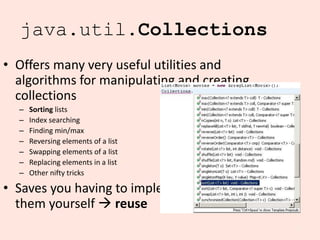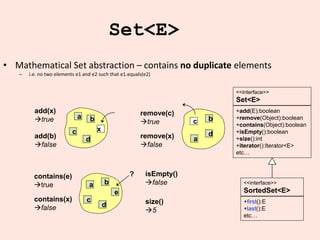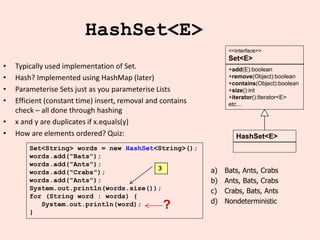JAVA PROGRAMMING - The Collections Framework
- 1. JAVA PROGRAMMING - The Collections Framework Dr R Jegadeesan Prof-CSE Jyothishmathi Institute of Technology and Science, Karimnagar
- 2. SYLLABUS The Collections Framework (java.util)- Collections overview, Collection Interfaces, The Collection classes- Array List, Linked List, Hash Set, Tree Set, Priority Queue, Array Deque. Accessing a Collection via an Iterator, Using an Iterator, The For-Each alternative, Map Interfaces and Classes, Comparators, Collection algorithms, Arrays, The Legacy Classes and Interfaces- Dictionary, Hashtable ,Properties, Stack, Vector More Utility classes, String Tokenizer, Bit Set, Date, Calendar, Random, Formatter, Scanner
- 3. UNIT IV : COLLECTION FRAMEWORK Topic Name : Introduction to Collection Framework Topic : Introduction to Collection Framework Aim & Objective : To make the student understand the concept of Collection Interfaces and Collection Classes and Legacy Classes and Interfaces. Application With Example :Java Program Using Collection Interfaces and Collection Classes Limitations If Any : Reference Links : • Java The complete reference, 9th edition, Herbert Schildt, McGraw Hill Education (India) Pvt. Ltd. • https://www.javatpoint.com/collections-in-java • Video Link details • https://www.youtube.com/watch?v=v9zg9g_FbJY
- 4. Universities & Important Questions : • What is the Collection framework in Java? • What are the main differences between array and collection? • Explain various interfaces used in Collection framework? • What is the difference between ArrayList and Vector? • What is the difference between ArrayList and LinkedList? • What is the difference between Iterator and ListIterator? • What is the difference between Iterator and Enumeration? • What is the difference between List and Set? • What does the hashCode() method? • What is the Dictionary class?
- 5. ▪ Collection Overview ▪ Collection Classes ▪ Collection Interfaces ▪ Legacy Classes ▪ Legacy Interfaces UNIT – IV CONTENTS
- 6. 6 Collection Overview • List<E> is a generic type (furthermore it’s a generic interface) • ArrayList<E> is a generic class, which implements List<E> public class ArrayList<E> implements List<E> { private E[] elementData; private int size; ... //stuff public boolean add(E o) { elementData[size++] = o; return true; } public E get(int i) { return elementData[i]; } //etc... } E is a type variable/ type parameter List<Money> list = new ArrayList<Money>(); List/ArrayList both parameterised with Money When you parameterise ArrayList<E> with Money, think of it as: E “becomes” Money public class ArrayList implements List<Money> { private Money[] elementData; private int size; ... //stuff public boolean add(Money o) { elementData[size++] = o; return true; } public Money get(int i) { return elementData[i]; } //etc... }
- 7. 7 More than just Lists… • ArrayLists and LinkedLists are just two of the many classes comprising the Java Collections Framework (JCF) • A collection is an object that maintains references to others objects – Essentially a subset of data structures • JCF forms part of the java.util package and provides: – Interfaces • Each defines the operations and contracts for a particular type of collection (List, Set, Queue, etc) • Idea: when using a collection object, it’s sufficient to know its interface – Implementations • Reusable classes that implement above interfaces (e.g. LinkedList, HashSet) – Algorithms • Useful polymorphic methods for manipulating and creating objects whose classes implement collection interfaces • Sorting, index searching, reversing, replacing etc.
- 8. 8 Interfaces Root interface for operations common to all types of collections Specialises collection with operations for FIFO and priority queues. Stores a sequence of elements, allowing indexing methods A special Collection that cannot contain duplicates. Special Set that retains ordering of elements. Stores mappings from keys to values Special map in which keys are ordered Generalisation Specialisation Collection Set List Queue SortedSet Map SortedMap
- 10. 10 java.util.Iterator<E> • Think about typical usage scenarios for Collections – Retrieve the list of all patients – Search for the lowest priced item • More often than not you would have to traverse every element in the collection – be it a List, Set, or your own datastructure • Iterators provide a generic way to traverse through a collection regardless of its implementation a f g d b c e i h a b c d e f g h i a b c d e f g h i Iterator next():d iterator() iterator() Set List hasNext()?
- 11. 11 Using an Iterator • Quintessential code snippet for collection iteration: public void list(Collection<Item> items) { Iterator<Item> it = items.iterator(); while(it.hasNext()) { Item item = it.next(); System.out.println(item.getTitle()); } } +hasNext():boolean +next():E +remove():void <<interface>> Iterator<E> Design notes: Above method takes in an object whose class implements Collection List, ArrayList, LinkedList, Set, HashSet, TreeSet, Queue, MyOwnCollection, etc We know any such object can return an Iterator through method iterator() We don’t know the exact implementation of Iterator we are getting, but we don’t care, as long as it provides the methods next() and hasNext() Good practice: Program to an interface!
- 12. 12 java.lang.Iterable<T> • This is called a “for-each” statement – For each item in items • This is possible as long as items is of type Iterable – Defines single method iterator() • Collection (and hence all its subinterfaces) implements Iterable • You can do this to your own implementation of Iterable too! – To do this you may need to return your own implementation of Iterator Iterator<Item> it = items.iterator(); while(it.hasNext()) { Item item = it.next(); System.out.println(item); } for (Item item : items) { System.out.println(item); } = <<interface>> Iterable<T> +iterator():Iterator<T> Collection<T> MyBag<T> List<T> Set<T> etc
- 13. 13 java.util.Collections • Offers many very useful utilities and algorithms for manipulating and creating collections – Sorting lists – Index searching – Finding min/max – Reversing elements of a list – Swapping elements of a list – Replacing elements in a list – Other nifty tricks • Saves you having to implement them yourself → reuse
- 14. 14 Collections.sort() • Java’s implementation of merge sort – ascending order public static <T extends Comparable<? super T>> void sort(List<T> list) 1) public static <T> void sort(List<T> list, Comparator<? super T> c) 2) Translation: 1. Only accepts a List parameterised with type implementing Comparable 2. Accepts a List parameterised with any type as long as you also give it a Comparator implementation that defines the ordering for that type What types of objects can you sort? Anything that has an ordering Two sort() methods: sort a given List according to either 1) natural ordering of elements or an 2) externally defined ordering. e b c d 0 1 2 3 4 b f 5 6 a a b b c 0 1 2 3 4 d e 5 6 f
- 15. 15 java.lang.Comparable<T> • A generic interface with a single method: int compareTo(T) – Return 0 if this = other – Return any +’ve integer if this > other – Return any –’ve integer if this < other • Implement this interface to define natural ordering on objects of type T public class Money implements Comparable<Money> { ... public int compareTo( Money other ) { if( this.cents == other.cents ) { return 0; } else if( this.cents < other.cents ) { return -1; } else { return 1; } } A more concise way of doing this? (hint: 1 line) return this.cents – other.cents; m1 = new Money(100,0); m2 = new Money(50,0); m1.compareTo(m2) returns 1;
- 16. 16 Natural-order sorting List<Money> funds = new ArrayList<Money>(); funds.add(new Money(100,0)); funds.add(new Money(5,50)); funds.add(new Money(-40,0)); funds.add(new Money(5,50)); funds.add(new Money(30,0)); Collections.sort(funds); System.out.println(funds); List<CD> albums = new ArrayList<CD>(); albums.add(new CD("Street Signs","Ozomatli",2.80)); //etc... Collections.sort(albums); public static <T extends Comparable<? super T>> void sort(List<T> list) What’s the output? [-40.0, 5.50, 5.50, 30.0, 100.0] CD does not implement a Comparable interface Wildcard (later)
- 17. 17 java.util.Comparator<T> • Useful if the type of elements to be sorted is not Comparable, or you want to define an alternative ordering • Also a generic interface that defines methods compare(T,T) and equals(Object) – Usually only need to define compare(T,T) • Define ordering by CD’s getPrice() → Money – Note: PriceComparator implements a Comparator para- meterised with CD → T “becomes” CD public class PriceComparator implements Comparator<CD> { public int compare(CD c1, CD c2) { return c1.getPrice().compareTo(c2.getPrice()); } } +compare(T o1, T o2):int +equals(Object other):boolean <<interface>> Comparator<T> CD +getTitle():String +getArtist():String +getPrice():Money Comparator and Comparable going hand in hand ☺
- 18. 18 Comparator sorting • Note, in sort(), Comparator overrides natural ordering – i.e. Even if we define natural ordering for CD, the given comparator is still going to be used instead – (On the other hand, if you give null as Comparator, then natural ordering is used) List<CD> albums = new ArrayList<CD>(); albums.add(new CD("Street Signs","Ozomatli",new Money(3,50))); albums.add(new CD("Jazzinho","Jazzinho",new Money(2,80))); albums.add(new CD("Space Cowboy","Jamiroquai",new Money(5,00))); albums.add(new CD("Maiden Voyage","Herbie Hancock",new Money(4,00))); albums.add(new CD("Here's the Deal","Liquid Soul",new Money(1,00))); Collections.sort(albums, new PriceComparator()); System.out.println(albums); public static <T> void sort(List<T> list, Comparator<? super T> c) implements Comparator<CD>
- 19. 19 Set<E> • Mathematical Set abstraction – contains no duplicate elements – i.e. no two elements e1 and e2 such that e1.equals(e2) +add(E):boolean +remove(Object):boolean +contains(Object):boolean +isEmpty():boolean +size():int +iterator():Iterator<E> etc… <<interface>> Set<E> remove(c) →true a b c d remove(x) →false add(x) →true a b c d x add(b) →false contains(e) →true ? contains(x) →false a b c d e isEmpty() →false size() →5 +first():E +last():E etc… <<interface>> SortedSet<E>
- 20. 20 HashSet<E> • Typically used implementation of Set. • Hash? Implemented using HashMap (later) • Parameterise Sets just as you parameterise Lists • Efficient (constant time) insert, removal and contains check – all done through hashing • x and y are duplicates if x.equals(y) • How are elements ordered? Quiz: Set<String> words = new HashSet<String>(); words.add("Bats"); words.add("Ants"); words.add("Crabs"); words.add("Ants"); System.out.println(words.size()); for (String word : words) { System.out.println(word); } ? a) Bats, Ants, Crabs b) Ants, Bats, Crabs c) Crabs, Bats, Ants d) Nondeterministic +add(E):boolean +remove(Object):boolean +contains(Object):boolean +size():int +iterator():Iterator<E> etc… <<interface>> Set<E> HashSet<E> 3
- 21. 21 TreeSet<E> (SortedSet<E>) • If you want an ordered set, use an implementation of a SortedSet: TreeSet • What’s up with “Tree”? Red-black tree • Guarantees that all elements are ordered (sorted) at all times – add() and remove() preserve this condition – iterator() always returns the elements in a specified order • Two ways of specifying ordering – Ensuring elements have natural ordering (Comparable) – Giving a Comparator<E> to the constructor • Caution: TreeSet considers x and y are duplicates if x.compareTo(y) == 0 (or compare(x,y) == 0) +first():E +last():E etc… <<interface>> SortedSet<E> TreeSet<E>
- 22. 22 TreeSet construction • String has a natural ordering, so empty constructor Set<String> words = new TreeSet<String>(); words.add("Bats"); words.add("Ants"); words.add("Crabs"); for (String word : words) { System.out.println(word); } Set<CD> albums = new TreeSet<CD>(new PriceComparator()); albums.add(new CD("Street Signs","O",new Money(3,50))); albums.add(new CD("Jazzinho","J",new Money(2,80))); albums.add(new CD("Space Cowboy","J",new Money(5,00))); albums.add(new CD("Maiden Voyage","HH",new Money(4,00))); albums.add(new CD("Here’s the Deal","LS",new Money(2,80))); System.out.println(albums.size()); for (CD album : albums) { System.out.println(album); } But CD doesn’t, so you must pass in a Comparator to the constructor What’s the output? 4 Jazzinho; Street; Maiden; Space What’s the output? Ants; Bats; Crabs
- 23. 23 Map<K,V> • Stores mappings from (unique) keys (type K) to values (type V) – See, you can have more than one type parameters! • Think of them as “arrays” but with objects (keys) as indexes – Or as “directories”: e.g. "Bob" → 021999887 +put(K,V):V +get(Object):V +remove(Object):V +size():int +keySet():Set<K> +values():Collection<V> etc… <<interface>> Map<K,V> +firstKey():K +lastKey():K etc… <<interface>> SortedMap<K,V> get(k) →a a b c b k m p n get(x) →null keys values put(x,e) →null a b c b k m p n e x put(k,f) →a a b c b k m p n f size() →4 remove(n) →b remove(x) →null a b c b k m p n keySet() →Set k m p n values() →Collection a b c b
- 24. 24 HashMap<K,V> • aka Hashtable (SE250) • keys are hashed using Object.hashCode() – i.e. no guaranteed ordering of keys • keySet() returns a HashSet • values() returns an unknown Collection +put(K,V):V +get(Object):V +remove(Object):V +size():int +keySet():Set<K> +values():Collection<V> etc… <<interface>> Map<K,V> HashMap<K,V> Map<String, Integer> directory = new HashMap<String, Integer>(); directory.put("Mum", new Integer(9998888)); directory.put("Dad", 9998888); directory.put("Bob", 12345678); directory.put("Edward", 5553535); directory.put("Bob", 1000000); System.out.println(directory.size()); for (String key : directory.keySet()) { System.out.print(key+"'s number: "); System.out.println(directory.get(key)); } System.out.println(directory.values()); 4 or 5? Set<String> “autoboxing” What’s Bob’s number?
- 25. 25 TreeMap<K,V> • Guaranteed ordering of keys (like TreeSet) – In fact, TreeSet is implemented using TreeMap ☺ – Hence keySet() returns a TreeSet • values() returns an unknown Collection – ordering depends on ordering of keys +firstKey():K +lastKey():K etc… <<interface>> SortedMap<K,V> TreeMap<K,V> Map<String, Integer> directory = new TreeMap<String, Integer>(); directory.put("Mum", new Integer(9998888)); directory.put("Dad", 9998888); directory.put("Bob", 12345678); directory.put("Edward", 5553535); directory.put("Bob", 1000000); System.out.println(directory.size()); for (String key : directory.keySet()) { System.out.print(key+"'s #: "); System.out.println(directory.get(key)); } System.out.println(directory.values()); Loop output? Bob's #: 1000000 Dad's #: 9998888 Edward's #: 5553535 Mum's #: 9998888 4 ? Empty constructor → natural ordering
- 26. 26 TreeMap with Comparator • As with TreeSet, another way of constructing TreeMap is to give a Comparator → necessary for non-Comparable keys Map<CD, Double> ratings = new TreeMap<CD, Double>(new PriceComparator()); ratings.put(new CD("Street Signs","O",new Money(3,50)), 8.5); ratings.put(new CD("Jazzinho","J",new Money(2,80)), 8.0); ratings.put(new CD("Space Cowboy","J",new Money(5,00)), 9.0); ratings.put(new CD("Maiden Voyage","H",new Money(4,00)), 9.5); ratings.put(new CD("Here's the Deal","LS",new Money(2,80)), 9.0); System.out.println(ratings.size()); for (CD key : ratings.keySet()) { System.out.print("Rating for "+key+": "); System.out.println(ratings.get(key)); } System.out.println("Ratings: "+ratings.values()); 4 Depends on key ordering Ordered by key’s price
- 27. 27 Thank you






![6
Collection Overview
• List<E> is a generic type (furthermore it’s a generic interface)
• ArrayList<E> is a generic class, which implements List<E>
public class ArrayList<E>
implements List<E> {
private E[] elementData;
private int size;
... //stuff
public boolean add(E o) {
elementData[size++] = o;
return true;
}
public E get(int i) {
return elementData[i];
} //etc...
}
E is a type variable/
type parameter
List<Money> list = new ArrayList<Money>();
List/ArrayList both
parameterised with Money
When you parameterise ArrayList<E>
with Money, think of it as:
E “becomes” Money
public class ArrayList
implements List<Money> {
private Money[] elementData;
private int size;
... //stuff
public boolean add(Money o) {
elementData[size++] = o;
return true;
}
public Money get(int i) {
return elementData[i];
} //etc...
}](https://image.slidesharecdn.com/javaprogramming-4-210507045105/85/JAVA-PROGRAMMING-The-Collections-Framework-6-320.jpg)









![16
Natural-order sorting
List<Money> funds = new ArrayList<Money>();
funds.add(new Money(100,0));
funds.add(new Money(5,50));
funds.add(new Money(-40,0));
funds.add(new Money(5,50));
funds.add(new Money(30,0));
Collections.sort(funds);
System.out.println(funds);
List<CD> albums = new ArrayList<CD>();
albums.add(new CD("Street Signs","Ozomatli",2.80));
//etc...
Collections.sort(albums);
public static <T extends Comparable<? super T>> void sort(List<T> list)
What’s the output?
[-40.0,
5.50,
5.50,
30.0,
100.0]
CD does not implement a
Comparable interface
Wildcard (later)](https://image.slidesharecdn.com/javaprogramming-4-210507045105/85/JAVA-PROGRAMMING-The-Collections-Framework-16-320.jpg)










